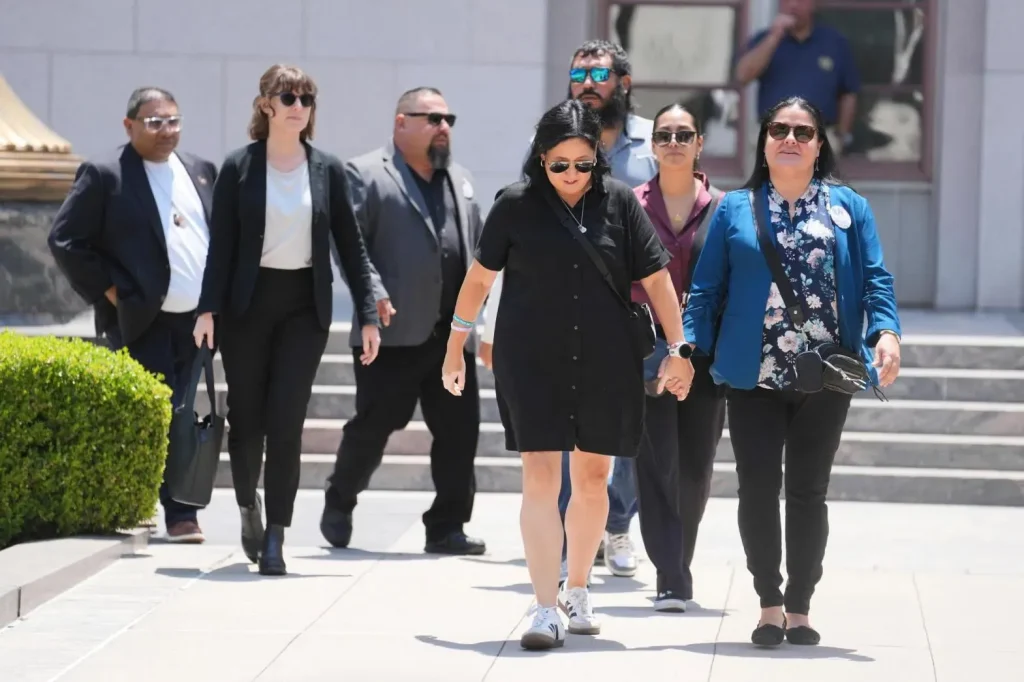The Call of Duty lawsuit has sparked significant debate about the intersection of video games and real-world violence, particularly following the tragic Robb Elementary School shooting in Uvalde, Texas. Activision, the powerhouse behind the popular video game franchise, is facing legal action from the families of the victims, who claim that the game’s violent content contributed to the actions of the shooter. In a recent court hearing, Activision’s attorney argued that the First Amendment protects the creative expression found in their games, distancing the company from responsibility for the horrific events. This case not only raises questions about the role of video games in society but also ignites discussions on broader issues of gun violence and video games, and their impact on behavior among young audiences. As the legal battle unfolds, it remains to be seen how the courts will navigate the complex relationship between entertainment, responsibility, and freedom of speech.
The ongoing lawsuit against Activision concerning its flagship title has turned the spotlight on the controversial relationship between interactive entertainment and societal issues. Following the heart-wrenching events at Robb Elementary School, families of the victims are seeking accountability from the makers of popular video games, including claims that these digital experiences may normalize gun violence. This litigation brings to light the broader implications of video games and their potential influence on behavior, as advocates explore whether creators of such content should face legal ramifications. As discussions unfold in the courtroom, the principles of the First Amendment also come into play, raising vital questions regarding artistic freedom in the context of modern media. Overall, this case encapsulates a critical dialogue about the responsibilities of game developers in an age increasingly affected by violent incidents.
Analyzing the Call of Duty Lawsuit’s Implications
The Call of Duty lawsuit presents a significant legal challenge that goes beyond mere accountability. Families affected by the tragic Robb Elementary School shooting claim that the creators of such video games influence behavior, particularly in young, impressionable individuals. Activision’s defense rests on a robust interpretation of the First Amendment, arguing that their creative expression should not be curtailed by the actions of players. This argues the broader question of how First Amendment rights apply to video games and whether they can be held liable for real-world violence.
Moreover, the suit underscores the intense discourse on the intersection of video games and gun violence. Critics often cite that immersive experiences in games like Call of Duty could normalize violent behavior. The ongoing debate also involves understanding the potential psychological impacts that these games might have, especially in the context of severe emotional and behavioral issues experienced by certain players. As more legal cases arise pertaining to gun violence and video games, it builds a case for exploring the ethical responsibilities of game developers.
The First Amendment and Its Protection of Video Games
The First Amendment’s protection of expression encompasses diverse mediums, including video games, which have increasingly been recognized as a form of artistic narration. Activision’s assertion hinges on this legal foundation, positing that the lawsuit threatens the integrity of creative works. Legal precedents support the view that artistic creators should not be held liable for the misuse of their products, emphasizing a standard that upholds creative freedoms in the face of societal backlash stemming from violent incidents.
This legal stance also stimulates a broader discussion on how society views video games within the cultural framework. As the court deliberates on the merits of this case, it reflects larger societal questions about the role of video games in youth culture and the myriad influences that shape individual behavior. Acknowledging the First Amendment’s scope in protecting video game content is key to fostering an environment that promotes creative exploration while also addressing concerns about the impacts of gun violence.
Gun Violence and Video Games: A Complex Relationship
The relationship between gun violence and video games is fraught with complexity, as highlighted by the current litigation against Activision. Opponents of video game violence argue that these immersive experiences can desensitize players to real-life violence, making actions like the tragic school shooting more conceivable. In contrast, defenders of video gaming, including game developers and legal advocates, argue that many factors contribute to violent behavior, asserting that video games are just one part of a larger societal issue.
Activision’s defense, which points to the lack of direct causation between video game gameplay and real-world violence, is critical in navigating this lawsuit. By focusing on the multiplicity of influences that affect behavior, it presents a viewpoint that video games alone cannot be culpable for the ramifications of individual actions. As the dialogue around gun violence and video games continues to evolve, the outcomes of such legal battles may significantly influence public perception and regulatory frameworks.
The Role of Immersion in Video Games
One of the pivotal arguments within this lawsuit is the claim regarding the immersive nature of video games like Call of Duty. The attorney representing the families argues that this level of engagement can lead players to adopt real-life actions reminiscent of their in-game experiences. This raises essential questions about the psychological impacts of video game immersion and how these experiences could potentially distort an individual’s perception of reality, particularly for younger audiences.
As gaming technology advances, creating increasingly realistic and immersive environments, understanding the implications of such experiences becomes more crucial. Players may become emotionally invested in the narratives and contexts established within these games, possibly blurring the lines between fiction and their understanding of the world. This phenomenon warrants a deeper examination of how immersion in video games influences player behavior and societal norms.
Exploring Artistic Expression in Video Games
The Call of Duty lawsuit highlights the ongoing debate surrounding artistic expression in the context of video games. Activision claims that the creative freedom associated with developing video games is protected by the First Amendment, which emphasizes the importance of artistic license. This assertion invites a broader discussion about how video games should be viewed as a legitimate art form that can convey complex narratives and foster emotional connections as effectively as traditional media like film or literature.
However, the challenge lies in balancing this artistic expression with the potential impact that such content can have on the audience, especially in discussions related to gun violence. As legal standards evolve, the recognition of video games as part of the artistic landscape necessitates a nuanced approach to evaluate the responsibilities of developers while safeguarding their creative rights. The outcome of this lawsuit could very well set precedents affecting future artistic endeavors in the gaming industry.
The Legal Landscape Surrounding Video Games
The legal landscape pertaining to video games is intricate, marked by ongoing discussions about liability, artistic expression, and societal impact. As lawsuits like the one against Activision arise, they compel courts to consider the relationship between creators and the effects of their products on players. The defense’s reliance on precedent suggests that there are established legal principles protecting video game creators from being held accountable for actions taken by players outside the game.
Additionally, this lawsuit reflects broader trends in legal evaluations concerning media’s role in societal behaviors. As judges weigh the merits of cases against game developers, there’s a recognition of the need for clarity in laws governing artistic expression in gaming. The intersection of law, ethics, and social responsibility in the gaming industry remains a critical area of exploration, shaping the future of video game litigation.
Families Speak Out: The Human Cost of Violence
The emotional weight carried by the families involved in this lawsuit against Activision is profound. Each parent that lost a child in the Robb Elementary School shooting represents a story of love, loss, and a desperate search for accountability in a world increasingly marred by gun violence. Their pursuit of justice exemplifies the human impact behind a legal battle that might otherwise be viewed through a more abstract lens. As their attorney presents damning evidence, such as depictions found within the game, it adds a personal dimension to the ongoing discussions about the role video games play in society.
Heart-stirring testimonies from family members further illustrate the complexities surrounding video games and their perceived influence on behavior. It serves as a reminder that these discussions are not just theoretical; they involve real people affected by the tragic consequences of violence. As society grapples with the ramifications of gun violence, the voices of those impacted by these events are crucial in navigating the ongoing debate.
Implications of Legal Decisions on Video Game Development
The outcome of the Call of Duty lawsuit carries significant implications for the future of video game development. Should the court find in favor of the families, it may set a precedent that holds developers accountable for the content they create and its potential ramifications. This could potentially lead to a chilling effect, where game designers might self-censor or alter their narratives to avoid future litigation, stifling creativity and reducing the diversity of stories told through interactive media.
Conversely, a ruling in favor of Activision would reaffirm the protective shield of the First Amendment for video game creators, emphasizing their right to artistic expression. It would signal to developers that they can continue to innovate and explore complex themes within their work without fear of retribution for the actions of players. Ultimately, the decisions made in such cases will shape the trajectory of the gaming industry and its responsibility to society.
Community Reactions to the Lawsuit
The public response to the Call of Duty lawsuit illuminates the divided perspectives surrounding video games and their connection to real-world violence. Some community members express support for the families, arguing that game developers should take responsibility for the content they produce, particularly in light of real-life tragedies like the Robb Elementary School shooting. This viewpoint suggests that video games, especially those that depict violence vividly, wield substantial influence over players and society.
On the other hand, a significant portion of the gaming community defends Activision, asserting that video games are not to blame for the actions of individuals. Supporters often cite the First Amendment’s essential role in protecting artistic expression, emphasizing the need to separate the actions of players from the creative works themselves. This duality in public sentiment serves as a reflection of the broader societal struggle to understand and address the complexities of gun violence, youth behavior, and media consumption.
Frequently Asked Questions
What is the Activision lawsuit related to the Robb Elementary School shooting?
The Activision lawsuit pertains to the families of victims from the Robb Elementary School shooting in Uvalde, Texas, who have sued Activision for alleged responsibility related to the shooter’s use of violent video games like Call of Duty. They argue that the game’s content may influence real-life behaviors associated with gun violence.
How does the First Amendment relate to the Call of Duty lawsuit?
In the Call of Duty lawsuit, Activision’s defense argues that the game’s content is protected under the First Amendment, which guarantees freedom of expression. They claim that creators of artistic works, including video games, cannot be held legally accountable for the actions of individuals who consume those works.
What are the implications of gun violence in video games as discussed in the Call of Duty lawsuit?
The implications of gun violence in video games, as highlighted in the Call of Duty lawsuit, center on whether exposure to such content can affect real-world behavior. Activision contends that artistic expression shouldn’t be blamed for criminal behavior, a stance supported by past legal rulings.
What evidence was presented during the hearing of the Call of Duty lawsuit?
During the hearing of the Call of Duty lawsuit, the attorney for the families, Josh Koskoff, presented evidence including contracts and correspondence between Activision executives and gun manufacturers. This aimed to demonstrate the relationship between depictions in the game and the gunman’s actions, arguing for the game’s influence on the shooter.
How have courts historically ruled on video games’ impact on behavior in lawsuits like the Activision lawsuit?
Courts have historically ruled that creators of video games, such as those involved in the Activision lawsuit, are not liable for the actions of players, emphasizing that artistic works are protected under the First Amendment. This precedent is a key argument in Activision’s defense against the lawsuit.
What was the outcome of the recent hearing on the Activision lawsuit?
As of the latest hearing related to the Activision lawsuit, no ruling was issued immediately by Superior Court Judge William Highberger. Both sides have presented their arguments regarding the implications of the First Amendment and the responsibilities of video game creators in relation to gun violence.
Why did the families of the victims file the Activision lawsuit?
The families of victims filed the Activision lawsuit to hold the maker of Call of Duty accountable for the perceived influence of violent video game content on the perpetrator of the Robb Elementary School shooting, asserting that such media can shape behavior even in tragic real-world contexts.
| Key Points |
|---|
| Activision argues for dismissal of the lawsuit based on First Amendment rights. |
| Families claim Activision and Meta Platforms are responsible for the actions of the shooter. |
| Activision’s lawyer states that artistic creators cannot be held liable for audience actions. |
| The lawsuit is part of numerous actions from Uvalde families following a tragic school shooting. |
| The shooter reportedly immersed himself in Call of Duty, influencing his actions. |
Summary
The Call of Duty lawsuit has sparked significant debate over the responsibility of video game creators in relation to violent actions committed by players. As Activision seeks to leverage First Amendment protections, this case raises critical questions regarding the intersection of artistic expression, gaming immersion, and real-world consequences. The proceedings highlight the ongoing struggle of families seeking accountability amidst a backdrop of national tragedy.




